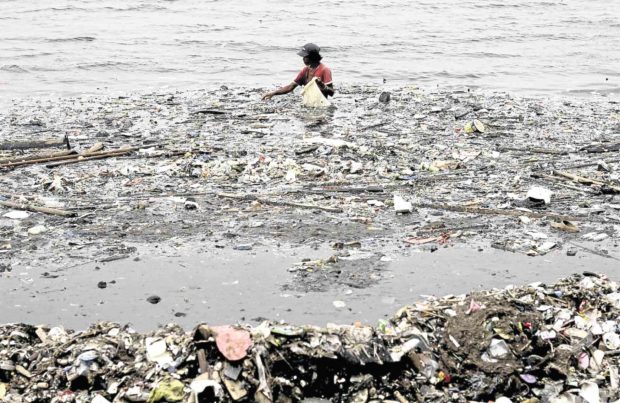
LIQUID DUMP A man searches for recyclables through garbage floating in the heavily polluted
Manila Bay. —RICHARD REYES
If the world-famous resort island of Boracay is a “cesspool,” Manila Bay, with its world-renowned sunset, is a “toilet bowl” that’s used every day but never flushed, according to environmental lawyer and Ramon Magsaysay laureate Antonio Oposa.
Speaking at a Senate inquiry into the rehabilitation of Manila Bay on Monday, Oposa, one of the Philippines’ leading environmental activists, said bacterial levels in the bay had quintupled from 1 million MPN/100 ml (most probable number per 100 milliliters) of fecal coliform to 5 million MPN/100 ml since 1999.
Fecal coliform refers to several types of bacteria found in human and animal waste.
Supreme Court order
“It was 1 million [MPN/100 ml] in 1999 when I filed the case in the Supreme Court. It’s 5 million now,” he told a hearing called by the Senate environment and natural resources committee chaired by Sen. Cynthia Villar.
The current coliform level is well beyond 200 MPN/100 ml, considered the safe level for swimming, Oposa said.
In December 2008, the Supreme Court ordered 13 government agencies to clean up, rehabilitate, and preserve Manila Bay, and restore and maintain its waters to safe levels to make them fit for swimming, skin diving and other forms of contact recreation.
But nearly a decade after the ruling, Manila Bay, with a coastline of 190 kilometers, remains filthy, Oposa said.
“We have turned Manila Bay into a toilet bowl. We take a dump on it every day but we do not even flush it. Aren’t we so vulgar?” he said.
Villar said not all of the 13 agencies directed by the Supreme Court to rehabilitate Manila Bay were doing their job.
These are the Department of Environment and Natural Resources, Metropolitan Manila Development Authority, Department of the Interior and Local Government, Department of Health, Department of Education, Philippine Coast Guard, Philippine Ports Authority, Bureau of Fisheries and Aquatic Resources, Department of Public Works and Highways, Philippine National Police-Maritime Group, Department of Budget and Management, Metropolitan Waterworks and Sewerage System, and Local Water Utilities Administration.
Heavy pollution
During the hearing, Villar castigated officials of the agencies for doing little to deal with the heavy pollution of Manila Bay.
“We must put a stop to the open defecation of informal settlers in the Port of Manila,” she said, adding that the agencies must work toward the resettlement or relocation of those communities.
“Their number keeps growing. They are already settled there,” she said.
Villar noted that the informal settlers invariably did not have toilets with proper sewage lines. “Where else would their waste go?” she said.